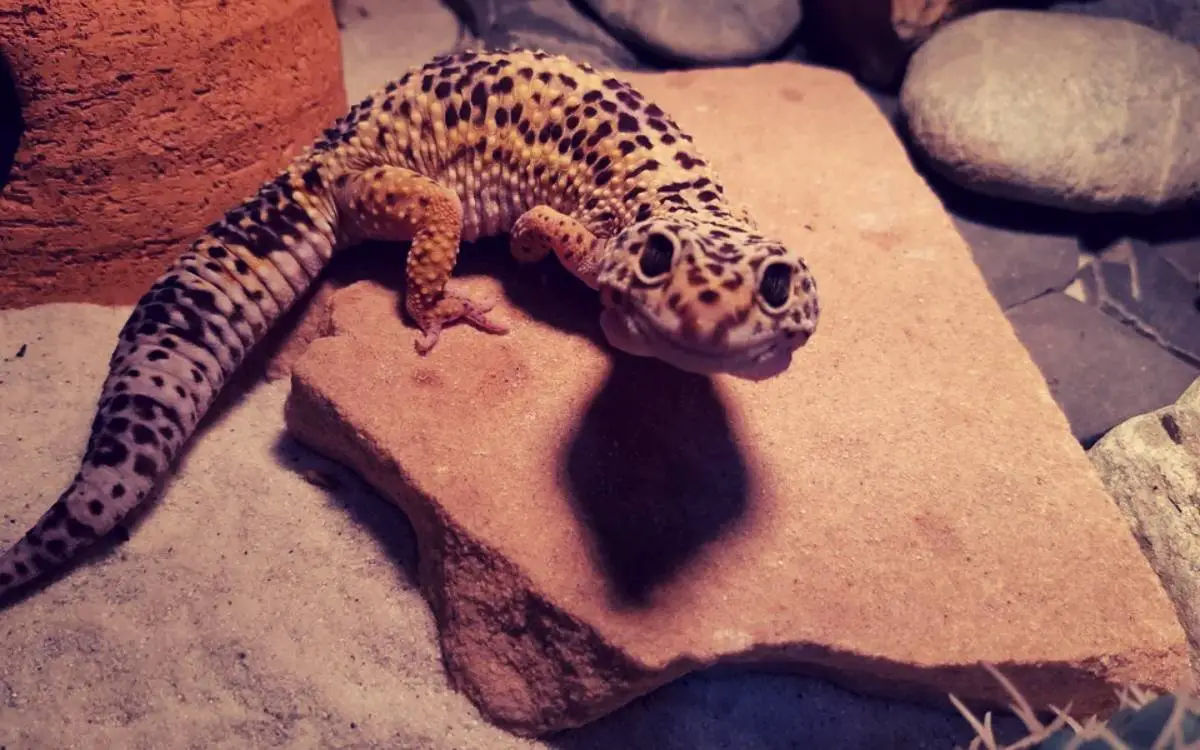Disclaimer: As an Amazon Associate I earn from qualifying purchases. Therefore, we may collect a share of sales from the links on this page, at no extra cost to you!

Owning a leopard gecko inspires a lot of curiosity, and one of the more commonly asked questions is whether or not Leopard geckos can see color.
Well, can they?
The short answer is yes! Leopard geckos can see color, but that’s not the only exciting thing about their eyesight. These beautiful reptiles have a vision that is well adapted for dim light. So, not only can they see color, but they can see colors in the dark thanks to a unique ability that lets them use reflections of the moonlight in the dark.
Here is more on that and everything else you need to know about Leo’s vision.
Jump to..
How Good is a Leopard Geckos’ Vision in The Dark?

Compared to our vision, a leopard gecko’s eyesight at night is pretty good. This is because leos are crepuscular animals, a term referring to animals that become primarily active at dawn and dusk. Contrary to what many people assume, leopard geckos are not strictly nocturnal (creatures that become active at night) as their train of activity typically starts at dusk and carries on slightly into the night.
However, there isn’t much lighting after sundown, which is why their eyes have evolved into seeing better at night. They have three cones, compared to a human’s eyes, which rely on rods. These cones help a leopard gecko pick up colors even in minor favorable lighting conditions, giving them better vision in the dark.
Generally, the cones make a gecko’s eye way more sensitive to light than the average mammal. Some species of geckos have eyes 350 times more sensitive than those of humans. In dim conditions, the cones work by allowing leopard geckos to dilate their pupils wide enough to let in enough light to process shapes and colors.
In natural conditions, this light comes from reflected moonlight. This begs the question; can leopard geckos see on a moonless night?
Can Leopard Geckos See on a Moonless Night?
When leopard geckos go hunting in the wild at dusk, they rely on moonlight to detect the prey and locate potential predators in their path. So, what happens on a moonless night? Do they go blind and stay “indoors” lest they fall prey to lurking predators? Do they abandon their hunting excursions and remain hungry for the night?
Well, the short answer is no; Leos can see pretty well even on a moonless night. The moon may be the primary source of light in the wild, but there are other sources, too, like starlight. In the absence of the moon, this and other sources provide enough light for a leopard gecko to go about its business. However, their performance will probably not be as good on a moonless night as when lunar light is at its brightest.
Does This Mean That Leopard Geckos Have Good Eyesight?
Well, not really? It can be pretty confusing, but having eyesight that performs pretty well in low lighting doesn’t necessarily translate to excellent or even good eyesight. This is especially the case with leopard geckos- although their eyes can see colors in low light, their overall vision isn’t exactly impressive. Leopard geckos may have eyes that see well in the dark, but those same eyes lack other areas.
The “great” in a leopard gecko’s night vision doesn’t mean clear but is somewhat relative to the low light conditions. Generally, their ability to pick up colors in dim light doesn’t give it a crystal-clear image of the object; they may be able to tell shapes and colors apart in the dark, but that doesn’t necessarily mean that they see a very sharp image. So, the overall clarity of the object isn’t that great, but it is usually enough to tell where the object is, what it’s doing, how big it is, and any other helpful information.
Do Leopard Geckos Need Lighting in Captivity?
Since many pet owners know that leopard geckos are more active towards the day’s end, they assume that these reptiles don’t need lighting. This is a massive misconception as leos do need lighting and heat for their well-being, but their lighting during the day should be different from that at night (more on that later).
In the wild, leopard geckos use natural daylight to steer their patterns. Even when asleep during the day, they are aware of their surroundings, and thus, you should provide your leopard gecko with ambient lighting. It is vital to maintain a healthy internal clock, which many owners don’t realize and end up making the mistake of denying their pets lighting during the day. Ultimately, this disrupts the reptiles’ day and night cycle, putting their health at risk.
So, you need to make sure that the enclosure is well lit during the day. You can either use a light bulb or make sure that the entire room is well lit. Provide a heat source too.
At night however, things change. Their internal clock tells them it needs to be dark, and that’s precisely how it should be. Leave the lighting on, and your Leo may think that it’s still daytime and remain hidden as they wait for night. If this happens regularly enough, their sleeping cycle becomes disrupted, stressing your gecko. As a result, they will start avoiding food and water.
If they find it hard to tell the difference between nighttime and daytime, they may develop problems with thermoregulation.
What Colors of Light Can Leopard Geckos See?
When seeking light fixtures for your pet’s enclosure, it helps to know the colors they can detect or are sensitive to. Generally, leopard geckos can see the blue and green light, which makes for excellent terrarium lighting. In addition to providing lighting conditions that mimic those in their natural habitat, blue light provides extra heat.
On the other hand, they cannot see infrared light but can see some different colors from the infrared beam. White light is generally not recommended as leopard geckos don’t like the heat that comes with it and rarely bask under direct sunlight.
You should also watch out for UV lights as specific concentrations can be problematic for your gecko’s skin over a sustained period.
Final Thoughts: Can Leopard Geckos See Color?
Interestingly, leopard geckos can indeed see color. Furthermore, they can have advanced vision that is adapted for low levels of light that is suitable for hunting at night.
Overall, leopard geckos are pretty cool creatures with a lot of interesting quirks.
Hopefully you learned something new today. If so, we have plenty of other content on leopard geckos that’ll keep you occupied for days!
